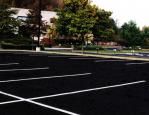Educational
Asphalt Paving Maintenance is Important
ANM Construction & Engineering knows how important it is to maintain any asphalt paved surface. Why? Because asphalt is a mixture of asphalt cement mixed with an aggregate of various sizes of crushed rock. It is prepared in a hot mix asphalt plant, where the asphalt cement and the crushed rock are mixed together so that the rock is coated with the asphalt cement. It must be applied to the surface and completely compacted and smoothed before it cools below 175°F, at which point it becomes hard.Regrettably, asphalt is placed in locations where it's subject to abuse from traffic, sunlight, water, oils, and other damaging effects. As soon as it is placed, deterioration begins. The asphalt surface begins to be attacked both from beneath and from above.
Water is one of the main enemies of asphalt. It is hard to control moisture levels in the soils and rock below pavements. Water makes clay swell, washes away dirt and erodes the base rock that is providing support for the asphalt. The resulting weak base does not provide sufficient support for the material, especially when the surface is traveled by vehicles with high axle loads such as garbage trucks, delivery vehicles or has a high traffic volume. Cracks may begin to appear, which in turn allow in more water ...that eventually causes pot holes.
The sun tends to oxidize the asphalt cement that is binding the rock together. As the asphalt cement oxidizes, the surface begins to lose pieces of the rock in the mixture. The asphalt surface is also damaged by oil leaks from vehicles. The oil will dissolve the asphalt cement and cause the surface to lose some of the rock also.
Asphalt requires maintenance and care to reach maximum life. The care is very inexpensive compared to full replacement of the asphalt surface, so penny pinching here can be very unwise later.
Make certain that the site is correctly graded and drained at installation to reduce pockets where water can collect and deteriorate the surface or substrate. Have a sealcoat applied to the surface at regular intervals. We can recommend a routine, which can be every few years depending on climate, use, and other factors. Sealing will extend the life of asphalt significantly, and one sealing job will cost only a tiny fraction of repaving and especially replacement or repair in the future with ever-rising oil prices. Seal coating will protect the asphalt surface from oil and gas drippings, oxidation, and water penetration therefore increasing the life of the pavement.
Timely repair of damaged areas is very important. That honeycomb pattern of cracks allows more and more water penetration, softening more and more of the base, leading to premature failure and the need for replacement of the asphalt. Today can save thousands of dollars over the life of your valuable pavement.
Why Does Asphalt Need Maintenance?
Even though asphalt is extremely strong and durable; the sun, weather, grass, traffic, and oil drippings do have a damaging effect.It is important to protect and maintain the value of your asphalt pavement and protect your investment. You want to have the best looking and longest lasting asphalt surface around!
What is Asphalt Made From?
The interesting thing about asphalt is that it's made up of rock, sand, and liquid asphalt binder that glue the rock and sand together. The rock and sand give asphalt its strength and that's why it can be used in high traffic zones, and why it can endure very heavy vehicles rolling on it. The liquid asphalt binder is a liquid component which gives asphalt its' durability and flexibility, and holds everything together. Technically this is called "asphalt cement" however everyone just refers to it as "asphalt".However, over time asphalt dries out and loses its flexible properties. The sun essentially cooks or dries the liquids right out of the hot mix asphalt surface. This progression does not happen over night, but as everyone knows asphalt is very black when it is first applied then over time turns gray in color. This graying process is called oxidization.
The Asphalt liquids have been cooked out slowly leaving dried out, gray, asphalt pavement. Before an asphalt surface gets to this point it is time for it to be seal coated to protect the pavement and increase its lifespan. We all know rock isn't very flexible so once the liquids are dried out the asphalt begins to crack and the pavement gets worse! Water seeps into it causing even more decay.
The outcome - small cracks become large cracks, and eventually large cracks become potholes, causing the surface to need repair. Or in severe cases the area may need to be replaced long before its normal lifespan estimated to be about 40 years.





